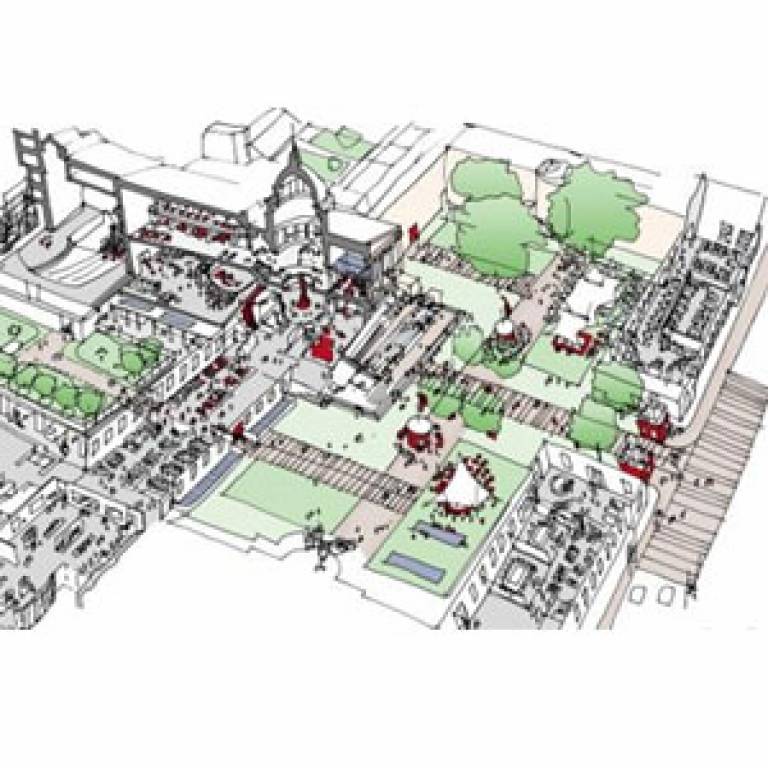UCL unveils masterplan for future estate growth
16 November 2011
UCL, one of the world's leading universities, has set out an ambitious programme of investment in its central London estate signalling plans for continued growth over the next 10 years.

The UCL Bloomsbury Masterplan, which is published today, sets out a vision for the long term improvement and development of the UCL core estate in Bloomsbury London WC1, to support the University's academic mission through the imaginative and effective use of its buildings and public spaces.
At a time of huge pressure on resources across many sectors, and particularly in Higher Education, the Masterplan signals a high degree of confidence and ambition in the plans to develop UCL, with expected investment of around £500 million in its Bloomsbury campus over a 10-15 year period.
The Bloomsbury Masterplan sets out a strategic framework for the development and improvement of our estate over the next 10-15 years.
Professor Malcolm Grant
The Masterplan, the result of an intensive planning and consultation process led by UCL's Estates division and leading architecture practice Lifschutz Davidson Sandilands, identifies the constraints on expansion in Bloomsbury and proposes that a new campus could be created elsewhere in London to provide world class education and research facilities.
Professor Malcolm Grant, UCL President & Provost said: "The Bloomsbury Masterplan sets out a strategic framework for the development and improvement of our estate over the next 10-15 years to ensure UCL's fine buildings in the heart of this great world city best support the University's highest academic standards.
"The fact that we are setting out such an ambitious programme of investment and renewal in these straitened times illustrates our global ambition and confidence in the future."
Alex Lifschutz, Director, Lifschutz Davidson Sandilands, said: ''Taking a diverse set of buildings, built up by the university incrementally over the last 185 years, and developing a plan to make this estate worthy of a great institution for the 21st century has been a challenging task. To our delight, it turns out that much of UCL's stock is rather fine and capable of adaptation to contemporary and future uses.
"Somewhat neglected outdoor spaces will be reconfigured as valuable places where cultural and intellectual engagement can thrive, for students, academic and other staff and also for ordinary Londoners. The approach is incremental, sensitive and sustainable. It will deliver an absolutely top university campus befitting UCL's reputation as a leading international institution in the heart of London.''
Among the key objectives of the Masterplan are:
- Planning for growth in academic activity; UCL's recently published White Paper sets out ambitious plans for the development of the institution over the next ten years, bringing new requirements for space and facilities for world-leading teaching and research
- Increasing the quantum and quality of space for teaching and research; with the Estate having developed organically over the past 185 years, and much of it having listed status, the Masterplan outlines strategies to deliver on the huge opportunities for better use of space and improved circulation across the campus. The approach is nimble and sustainable, relying on innovative ways of using existing buildings for new uses. The masterplan anticipates future change with its loose fit strategy - thus buildings are not to be locked into current functions but capable of adaptation using a standard kit of parts.
- Reducing the University's carbon footprint by these and other means; UCL has clearly established objectives for meeting its environmental obligations and the Masterplan embeds sustainability within all strategies and projects;
- Enhancing the experience of students, staff and the public; an array of hubs is proposed across the campus, in response to the changing way in which today's students study with more open access social/project learning space;
- To open the campus up to the public, world-class museums and collections will be relocated to key perimeter points, signs and way-finding improved and the ground floor of academic buildings opened up so that the activities are more visible and more accessible.
- A new Student Centre on a site adjacent to the Bloomsbury Theatre on Gordon Street is proposed. This will bring together many of the student-focused functions currently spread over the site. This is the only significant new building proposed In the Masterplan.
The Masterplan
establishes long term strategies for improvement and identifies up to 100
projects for investment over the next 10 - 15 years likely to total around £500
million. A first phase of projects have been identified and is now being
progressed. The Masterplan builds on significant investment in the UCL estate, with capital expenditure over the last five years totalling over £200 million.
To support the emerging investment
programme, UCL is reviewing its consultancy
frameworks and has this week published a procurement notice in the Official Journal of the European Union seeking
interest from professional consultancy companies to support a wide range of
construction and estates related projects to develop, maintain and improve the
UCL Estate.
Media contact: Dominique Fourniol
 Close
Close

